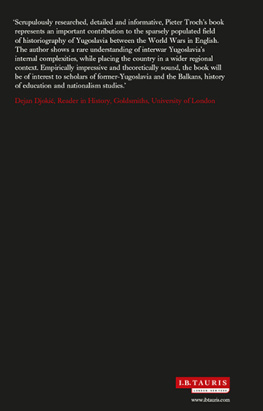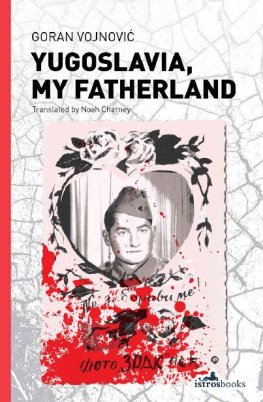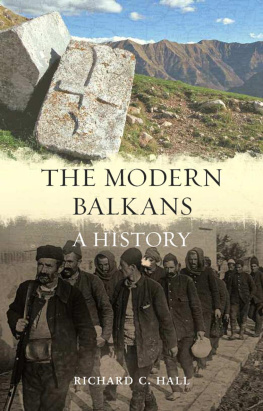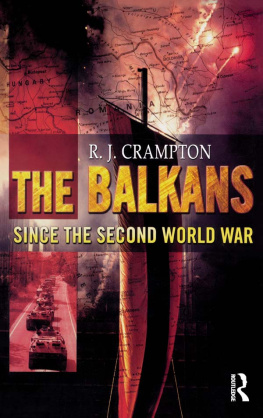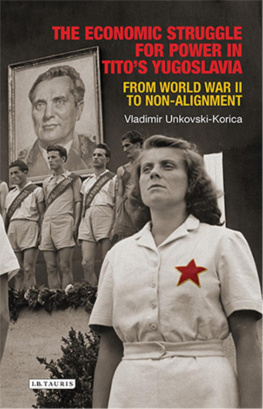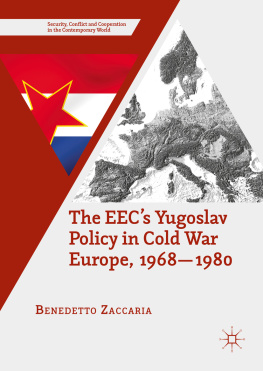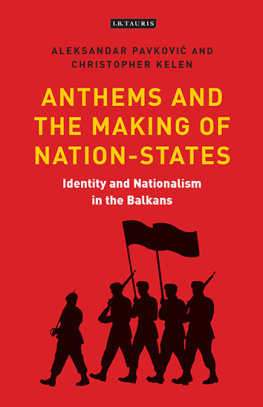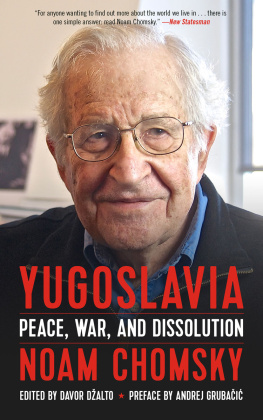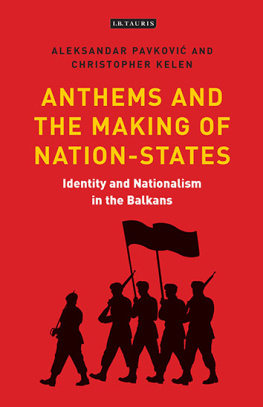Troch - Nationalism and Yugoslavia: education, Yugoslavism and the Balkans Before World War 2
Here you can read online Troch - Nationalism and Yugoslavia: education, Yugoslavism and the Balkans Before World War 2 full text of the book (entire story) in english for free. Download pdf and epub, get meaning, cover and reviews about this ebook. City: London;New York, year: 2015, publisher: I.B. Tauris, genre: Politics. Description of the work, (preface) as well as reviews are available. Best literature library LitArk.com created for fans of good reading and offers a wide selection of genres:
Romance novel
Science fiction
Adventure
Detective
Science
History
Home and family
Prose
Art
Politics
Computer
Non-fiction
Religion
Business
Children
Humor
Choose a favorite category and find really read worthwhile books. Enjoy immersion in the world of imagination, feel the emotions of the characters or learn something new for yourself, make an fascinating discovery.
Nationalism and Yugoslavia: education, Yugoslavism and the Balkans Before World War 2: summary, description and annotation
We offer to read an annotation, description, summary or preface (depends on what the author of the book "Nationalism and Yugoslavia: education, Yugoslavism and the Balkans Before World War 2" wrote himself). If you haven't found the necessary information about the book — write in the comments, we will try to find it.
Troch: author's other books
Who wrote Nationalism and Yugoslavia: education, Yugoslavism and the Balkans Before World War 2? Find out the surname, the name of the author of the book and a list of all author's works by series.
Nationalism and Yugoslavia: education, Yugoslavism and the Balkans Before World War 2 — read online for free the complete book (whole text) full work
Below is the text of the book, divided by pages. System saving the place of the last page read, allows you to conveniently read the book "Nationalism and Yugoslavia: education, Yugoslavism and the Balkans Before World War 2" online for free, without having to search again every time where you left off. Put a bookmark, and you can go to the page where you finished reading at any time.
Font size:
Interval:
Bookmark:

Pieter Troch completed his PhD in East-European Languages and Cultures at Ghent University. He is currently working as Project Officer at the European Centre for Minorities Issues Kosovo.
Scrupulously researched, detailed and informative, Pieter Trochs book represents an important contribution to the sparsely populated field of historiography of Yugoslavia between the World Wars in English. The author shows a rare understanding of interwar Yugoslavias internal complexities, while placing the country in a wider regional context. Empirically impressive and theoretically sound, the book will be of interest to scholars of former-Yugoslavia and the Balkans, history of education and nationalism studies.
Dejan Djoki, Reader in History, Goldsmiths, University of London
NATIONALISM
AND
YUGOSLAVIA
Education, Yugoslavism and the
Balkans Before World War II
P IETER T ROCH

Published in 2015 by
I.B.Tauris & Co Ltd
London New York
www.ibtauris.com
Copyright 2015 Pieter Troch
The right of Pieter Troch to be identified as the author of this work has been asserted by the author in accordance with the Copyright, Designs and Patents Act 1988.
All rights reserved. Except for brief quotations in a review, this book, or any part thereof, may not be reproduced, stored in or introduced into a retrieval system, or transmitted, in any form or by any means, electronic, mechanical, photocopying, recording or otherwise, without the prior written permission of the publisher.
References to websites were correct at the time of writing.
International Library of Historical Studies 95
ISBN: 978 1 78076 753 6
eISBN: 978 0 85773 768 7
ePDF: 978 0 85772 850 0
A full CIP record for this book is available from the British Library
A full CIP record is available from the Library of Congress
Library of Congress Catalog Card Number: available
CONTENTS
ACKNOWLEDGEMENTS
This book is a thorough revision of the doctoral dissertation I defended at Ghent University in September 2012. The dissertation came about with the financial support of the Research Foundation Flanders (Fonds voor Wetenschappelijk Onderzoek Vlaanderen). It has benefited greatly from the help and support of many people. First of all, I wish to thank my supervisor Raymond Detrez for sharing his profound knowledge of Balkan history and society with numerous cohorts of students at Ghent and instilling critical affinity with the region into each and every one of us. He helped me launch this doctoral study and encouraged and slowed me down through every step of the process, up until the finalisation of this book. I am also grateful for the support and friendship I received from the staff at the Department of Slavic and East-European Studies at Ghent University. I am particularly indebted to Ben Dhooge and Stijn Vervaet for their critical reviewing of my work and friendly support, and to Spomenka Brai and Pavel Ocepek for reading chapters of my dissertation and correcting translations from Serbo-Croatian and Slovenian. Unless otherwise noted, all translations in this book are mine.
I owe a tremendous debt to Ljubodrag Dimi, who has been so kind to guide me as a fresh graduate student in Belgrade and put me on the way with my research in the Archives of Yugoslavia and the library of the University of Belgrade. Also in later stages of my research his door was always wide open for advice and suggestions. Additional thanks to Ivana Dobrivojevi, Maria Falina, Adnan Jahi, Vladan Jovanovi, Aleksandar Mileti, Sran Miloevi and Toma Pavlin for generously sharing their findings with me and for assisting me during my research stays in Belgrade and Ljubljana. I am also thankful to the staff of the library of Matica srpska in Novi Sad, the National Library of Serbia, the University Library, and the Archives of Serbia and Montenegro in Belgrade, and the Pedagogical Museum in Ljubljana, who have kindly assisted me with my search for sources.
The members of my doctoral jury, Dejan Djoki, Bernard Lory, Wolfgang Hpken, Maarten Van Ginderachter, and Stijn Vervaet, have made valuable and thoughtful comments that helped me turn my dissertation into a book. Carole Richards, finally, did a wonderful job proofreading and copy-editing my manuscript. Her careful, thoughtful, and concise suggestions on not only language issues but also the content of my work have stimulated me to think from the perspective of the not so well-informed reader (ignorant, she would call it, though that would not do justice to herself and the reader). Her reviews have made the revision process an instructive and pleasant job. If the language in these acknowledgements does not run as smoothly as it does in the rest of the book, it is because Carole did not revise this part.
CHAPTER 1
INTRODUCTION
The idea that the South Slavs speakers of South Slav languages, today categorised as Slovenes, Croats, Bosniaks, Serbs, Montenegrins, Macedonians, and Bulgarians are part of a single overarching Yugoslav nation is one of the most intriguing features in the modern cultural and political history of the Balkans. The cultural and linguistic closeness of Bosniaks, Croats, Montenegrins, and Serbs in particular and the relevance of this commonality in the constellation of nineteenth- and twentieth-century politics make the Yugoslav idea logical from a nationalist point of view and explain the support it received throughout the modern period, yet the same period has also witnessed vehement national dissociations among South Slavs precisely over cultural and political divides. The ideal of Yugoslav national unification legitimised the establishment of the interwar Yugoslav kingdom and its socialist successor state, yet both states ended in nationally framed intercommunal conflicts. With the benefit of hindsight, the Yugoslav idea is all too easily discarded as insincere or nave and doomed to fail. This book stems from the conviction that the inconsistencies between South Slav convergence and divergence can only be understood by turning away from the idea of the predetermined failure of the Yugoslav idea and looking closely at the institutionalisation of Yugoslav nationhood during the existence of the Yugoslav state.
* * *
The Yugoslav idea had a long history predating the establishment of the Kingdom of Serbs, Croats, and Slovenes in 1918. During the nineteenth century, Yugoslavism complemented not only Croatian but also to a lesser extent Serbian and Slovenian national ideologies. Elements of CroatSerb and South Slav unity occupied a central position in prominent intellectual, cultural, and political trends in the South Slav parts of the Habsburg Empire. The Illyrian Movement centred on a group of intellectuals in Zagreb during the 1830s and 1840s was the first significant culturalpolitical movement that took the idea of Croatian and South Slav cultural unity, essentially revolving around CroatSerb linguistic unity, as the starting point for political and cultural demands. The political and cultural work of Bishop Josip Juraj Strossmayer continued the Yugoslav tradition in Croatia-Slavonia during the 1860s and 1870s.
Within the general spirit of euphoria that accompanied the end of the Balkan Wars and World War I and the disintegration of the Austro-Hungarian and Ottoman Empires, the majority of the political and cultural elites in the Yugoslav lands justified and welcomed the creation of the Kingdom of Serbs, Croats, and Slovenes as a crucial step in the economic, political, and cultural modernisation of the Yugoslav lands and people. They closely connected this optimism with Yugoslav national liberation and unity, asserting that successful modernisation would go hand in hand with the strengthening of Yugoslav national consciousness and the national merging of Serbs, Croats, and Slovenes.
Next pageFont size:
Interval:
Bookmark:
Similar books «Nationalism and Yugoslavia: education, Yugoslavism and the Balkans Before World War 2»
Look at similar books to Nationalism and Yugoslavia: education, Yugoslavism and the Balkans Before World War 2. We have selected literature similar in name and meaning in the hope of providing readers with more options to find new, interesting, not yet read works.
Discussion, reviews of the book Nationalism and Yugoslavia: education, Yugoslavism and the Balkans Before World War 2 and just readers' own opinions. Leave your comments, write what you think about the work, its meaning or the main characters. Specify what exactly you liked and what you didn't like, and why you think so.

